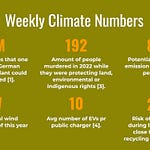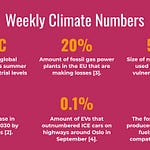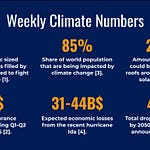Welcome to this week’s edition of The Weekly Climate 🎉
References: [1], [2], [3], [4] and [5].
‼️News you can’t miss
Here’s one important scary/bad (🙀), good (😻), interesting (😼) and fossil (💩) news item.
🙀 Record-shattering heat extremes expected to be more common.
😻 An uplifting and motivational post about how we can still stop climate chaos.
😼 A new study looks at how many deaths each countries emissions are causing.
💩 The world’s flagship fossil fuel carbon capture project has failed miserably.
👩⚕️ Status: Climate & Science
Let’s look at how we’re doing this week!
[#india] — India has also been hit by heavy moonsoon rain which so far has killed more than 160 people in the country. Just look at the devastation in this video. Indian climate scientists are trying to raise awareness that stronger adaptation are needed as global warming will increase the number and intensity of the moonsoon and cyclones in the area. The tricky thing is that India is in fact very dependent on the right amount of monsoon rain. Too little and there will be drought, too much (like right now) will wash away useful fertile topsoil.
[#heat] — A new study has found that “record-shattering” heat extremes as the one witnessed recently which broke heat records by more than 5C, will be more and more common with global warming. Especially in the mid to Northern lattitudes. These events will not only be more common, but also longer lasting and more intense.
[#heatwaves] — Remember a few weeks ago when the US West coast was baked in a “heat dome” (a large area of high pressure parked over an area of land)? There’s another currently running from Montana to Georgia in the US. While not as fierce it is still leaving heat warnings in 17 states across the US.
📰 The 7 Grand Challenges
⚡️Decarbonize Electricity
Clean electricity is the one do-or-die challenge we must solve.
[#energystorage] — Here’s a market report on the molten salt storage market. It is expected to grow 15% by 2026 from 629M$ in 2019 to 1.7B$.
[#tidalpower] — The world’s most powerful tidal turbine just started to crank out power in the UK. It can power thousands of homes for the next 15 years.
🏘 Reduce impact of urban and rural areas
Lowering the impact of urban and rural areas.
[#electrichighway] — In Indiana a project has been launched that aims to make the world’s first highway that will charge EVs while they drive on it. The project hopes to start building the first highway in 2023.
[#batteryswap] — The battery swapping idea of Shai Agassi’s Better Place was genious as it solved the major issue that many people are having with EVs — that they have to be charged which takes (some) time. If you thought Better Place was dead take a look at this episode of “Just have a think”, in which the authors explores this battery swapping trend in China and India where apparently it is growing.
[#urbantransportation] — Going carless is mostly a question of infrastructure, i.e. how can you get to where you need to go (work, school, kindergarten) without the use of a car. Here’s a list of the top 10 best and worse US cities to go carless in.
[#businesses] — The first article in The Guardian’s newly launched series “Green light”, they dive into the truth behind corporate climate pledges. The recent trend for most businesses are to make a climate pledge, however what The Guardian finds is that few of these are ambitious enough with only 20% science-backed. None of the targets are ambitious enough to get to 1.5C, that’s for sure.
🛁 Clean non-electrifiable activities
Some activities we do today can’t be electrified, these must be cleaned some other way.
[#trucks] — This BNEF article provides an optimistic look at electrifying trucks. Most people agree that long-haul heavy duty trucks are unlikely to be electrified soon simply because batteries are still too heavy or more crucially and technical, their energy density is too low. But there are many heavy duty truck applications that are not long-haul, such as garbage trucks, who rarely goes on freeways and rarely drives more than a few hundred kilometers everyday. These would be possible to electrify.
🌳 Protect and grow nature
Nature is our ally, we must protect it and help it help us.
[#wildfires] — Wildfires are not just something that happens in the US, Canada and Siberia. It happens in Europe too. Here’s a look at Sardinia, who has recently been ravaged by severe wildfires killing everything from humans and animals to an 1100 years old olive tree. Sardignia is not the only place in Italy that burns as there are 800 wildfires currently burning in the country.
[#wildfire] — Here’s some good-ish wildfire news. There’s evidence from one of the largest fires currently burning in the US called the Bootleg fire, that thinning forests of fuel using techniques like controlled burns will help control the behavior of even megafires like this one.
[#streettrees] — Here’s a quick guide for how to plant a tree on your street. The article looks at the US, but is likely similar in whichever country you live in. Planting trees in cities are important as they help cities adapt to climate change in countless ways.
🍽 Optimize food
Without the lower impact of food or drink the hero doesn’t work (modified old danish proverb).
[#gardening] — As I just moved from an apartment to a house I’m trying to get into gardening. So this article was right up my alley. It’s about a guy who has written a gardening column for 45 years and which have ended up helping to document climate change.
📦 Other / catch-all
All the other stuff that I couldn’t fit into any of the other categories, than the other category.
[#xr] — Extinction Rebellion has launched a tabloid, which according to their press release, presents the truth about the climate crisis that the Rupert Murdoch media empire is too scared to publish. There’s no doubt that Rupert Murdoch is not a friend of much related to climate action. But I do hope that their new publication won’t be too doomist but striking a good balance between facts and action.
[#motivation] — If you’re feeling down from all the pretty horrible climate disasters happening all over the world these days, this post should hopefully make you feel more empowered. At least it had that effect on me.
⭐️Special Topics
🎩 Global and local policy
We have a special interest in covering the major global and local policies regarding climate, whether good or bad.
[#g20] — The G20 meeting held last week was finished without important progress on a couple of major points: (1) Like the G7 meeting recently no agreements on when to phase-out coal was reached. Most countries agree to phase-out coal, but China, India and Russia blocked it. (2) Whether to move faster to decarbonize as the Paris agreement requires them to. The final outcome of the G20 meeting was to upgrade the countries NDCs (which so far unfortunately, have done very little than being targets).
[#australia] — Politicians from US, EU and UK have met a number of times in Canberra in Australia to try and convince the Australian government to make a firm commitment to reach net zero by 2050. Australia is wellknown for not doing enough politically to get to net-zero.
[#USA] — A world wide first ever ban on building new fossil fuel infrastructure was just passed in the county of Whatcom in Washington. The ban makes sure that no more fossil fuel infrastructure whether pipelines or refineries can be built.
🛡 Adaptation
Adapting our civilization to the coming climate crisis is vital. Here we cover various ways that is happening (or isn’t).
[#wildfire] — Many farms in California has lost the ability to be covered by insurance simply because insurance companies won’t cover their property or demand outrageous prices. In once case a farmers premium went from 16K$ to 55K$ in one year. The insurance industry in California is under heavy pressure. The losses from just the years 2017 and 2018 was higher than their profits from the last 25 years. Here’s a look what many vineyeards in California are going through after severe wildfires teared through the area last year.
[#survival] — A new study concludes that New Zealand followed by UK; Tasmania and Ireland are the best places to survive the collapse of society. Countries are ranked based on a number of parameters that are useful to survive, such as their ability to grow food to support the population, protect borders from unwanted migration and so on.
[#utilities] — Here’s a look at how the climate crisis appear to have caught power companies completely unprepared — at least in the US. It even cites a case where Oregon residents called their power company in hordes to have the power turned off due to an approaching storm. They were afraid that the storm would rip out power lines which would cause fire as seen in the California. This is pretty unprecedented and goes to show how much with their pants down the power companies appear to have been taken.
[#china] — While the Chinese boom in recent decades have pulled millions of people out of poverty, it forgot one thing: Climate adaptation. This became very clear from last weeks severe floods which killed at least 69 people in central China. While flooding has always been an issue in China, the rapid urbanization has meant that the rain now has fewer places to be absorbed and scientists believes that this is exacerbating the problems in China.
⛽️ Major Carbon Emitters
We have a special interest in covering the moving of the major carbon emitters as these are the key roadblock to climate action.
[#health] — Here’s an interesting (if a bit macabre) new framing of carbon emissions which looks at the costs of carbon footprints, not in dollars, but in lives. How many deaths does your emissions cause (i.e. from increases climate risks not directly of course)? For instance, you would need 3 American’s emissions to kill one person. Where as you would need 146 Nigerian’s emissions to kill one person.
[#lobbyism] — Here’s yet another example of how one US city, Tampa, tried to run on 100% clean energy, but which the lobbyism by the fossil gas industry on a state-level made sure it couldn’t.
[#carboncapture] — The world’s largest carbon capture project has failed it’s 5 year target pretty badly. As the Chevron-run refinery has only managed to capture 30% of it’s target in those 5 years. It is expected that Chevron will have to purchase roughly 73M$ in carbon credits to make up for that short fall. It also goes to show how far along most politicians trusted carbon capture technology is when the flagship operation fails this bad.
That’s it for this week folks!
Remember if you’re feeling down, angry or sad from some of the news in this newsletter one cure is to act. And one way you can always act that also happens to be one of the most powerful things you can do is to talk about it. That also works if what you just read made you hopeful or happy btw.
If you enjoyed this newsletter don’t forget to share it with your friends, coworkers or other people you think could benefit from getting it. If you got directed here by a friend or another link on the Internet don’t forget to subscribe!
See you all next week 👋












